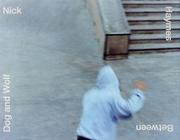| Listing 1 - 6 of 6 |
Sort by
|
Book
ISBN: 9781576875391 1576875393 Year: 2010 Publisher: Brooklyn, N.Y. Vice Books
Abstract | Keywords | Export | Availability | Bookmark
 Loading...
Loading...Choose an application
- Reference Manager
- EndNote
- RefWorks (Direct export to RefWorks)
Thirty years of photography documenting the NYC skate scene.
Book
ISBN: 9782917855195 2917855193 Year: 2011 Publisher: Paris B42
Abstract | Keywords | Export | Availability | Bookmark
 Loading...
Loading...Choose an application
- Reference Manager
- EndNote
- RefWorks (Direct export to RefWorks)
Skateboarding --- Skateboarders --- History --- History --- Skateboarding --- Skateboarders --- History

ISBN: 9783905714210 3905714213 Year: 2007 Publisher: [place of publication not identified] Nieves
Abstract | Keywords | Export | Availability | Bookmark
 Loading...
Loading...Choose an application
- Reference Manager
- EndNote
- RefWorks (Direct export to RefWorks)
Book
ISBN: 9781934429839 193442983X Year: 2010 Publisher: Pasadena Ammo
Abstract | Keywords | Export | Availability | Bookmark
 Loading...
Loading...Choose an application
- Reference Manager
- EndNote
- RefWorks (Direct export to RefWorks)
"One afternoon in 1975, a young photographer named Hugh Holland drove up Laurel Canyon Boulevard in Los Angeles and encountered skateboarders carving up the drainage ditches along the side of the canyon. Immediately transfixed by their grace and athleticism, he knew he had found an amazing subject. Although not a skateboarder himself, for the next three years Holland never tired of documenting skateboarders surfing the streets of Los Angeles, parts of the San Fernando Valley, Venice Beach, and as far away as San Francisco and Baja California, Mexico"--From publisher's website. "One afternoon in 1975, a young photographer named Hugh Holland drove up Laurel Canyon Boulevard in Los Angeles and encountered skateboarders carving up the drainage ditches along the side of the canyon. Immediately transfixed by their grace and athleticism, he knew he had found an amazing subject. Although not a skateboarder himself, for the next three years Holland never tired of documenting skateboarders surfing the streets of Los Angeles, parts of the San Fernando Valley, Venice Beach, and as far away as San Francisco and Baja California, Mexico. During the mid-1970s, Southern California was experiencing a serious drought, leaving an abundance of empty swimming pools available for trespassing skateboarders to practice their tricks. From these suburban backyard haunts to the asphalt streets that connected them, this was the place that created the legendary Dogtown and Z-Boys skateboarders. With their requisite bleached blonde hair, tanned bodies, tube socks and Vans, these young outsiders are masterfully captured against a sometimes harsh but always sunny Southern California landscape in Locals Only"--Publisher's website.
Holland, Hugh, --- Skateboarders --- Youth --- Nineteen seventies --- Photography of sports
Book
ISBN: 9782336402819 Year: 2024 Publisher: Paris : L'Harmattan,
Abstract | Keywords | Export | Availability | Bookmark
 Loading...
Loading...Choose an application
- Reference Manager
- EndNote
- RefWorks (Direct export to RefWorks)
Parcourant la cité, s'établissant de manière prolongée sur les places publiques, les skaters animent, jouent, mettent en scène ou perturbent l'animation des centres urbains. Simple jouet à roulettes devenu symbole d'un "renouveau" olympique, pratique "tendance" chez des jeunes dont la tranche d'âge ne cesse d'être repoussée, le skateboard engage ses pratiquants dans un mode de vie aux contours particulièrement délimités. Cet ouvrage va justement tenter de démontrer la complexité et la richesse de ce mode de vie dont les logiques, une fois cernées, atténuent le caractère déviant et au contraire clarifie l'aspect positif et formateur de cette activité physique urbaine. Que ce soit les adages comme "Skateboarding is not a crime" ou "Skateboarding saved my Life", l'analyse proposée ici décrypte les facettes d'une culture skateboard planétaire capable de modifier la vie de plusieurs générations de jeunes urbains. Julien Laurent est docteur en sociologie diplômé de l'Université de Poitiers en 2008. Il a été attaché temporaire d'éducation et de recherches à l'Université des Antilles et de la Guyane (2008/2009) puis post-doctorant à l'Université du Québec à Montréal (2010/2011). Il a poursuivi ses recherches de terrain sur le skateboard à San Diego, en Californie, jusqu'en 2016 (julienlaurentjf.com). Professeur des écoles dans l'Académie de Guadeloupe, il se questionne toujours sur les thématiques liées au skateboard et son mode de vie.--Page 4 of cover.
Skateurs --- Skate-board (sport) --- Cultures urbaines (culture populaire) --- Conditions sociales --- Société --- culture urbaine --- sociologie du loisir --- sport --- sociologie urbaine --- Languedoc Roussillon --- Street life. --- Skateboarders.
Book
ISBN: 3030248577 3030248569 Year: 2020 Publisher: Cham, Switzerland : Palgrave Macmillan,
Abstract | Keywords | Export | Availability | Bookmark
 Loading...
Loading...Choose an application
- Reference Manager
- EndNote
- RefWorks (Direct export to RefWorks)
This book explores the ways in which religion is observed, performed, and organised in skateboard culture. Drawing on scholarship from the sociology of religion and the cultural politics of lifestyle sports, this work combines ethnographic research with media analysis to argue that the rituals of skateboarding provide participants with a rich cultural canvas for emotional and spiritual engagement. Paul O’Connor contends that religious identification in skateboarding is set to increase as participants pursue ways to both control and engage meaningfully with an activity that has become an increasingly mainstream and institutionalised sport. Religion is explored through the themes of myth, celebrity, iconography, pilgrimage, evangelism, cults, and self-help.
Sports-Sociological aspects. --- Religion and sociology. --- Sociology of Sport and Leisure. --- Sociology of Culture. --- Sociology of Religion. --- Religion and society --- Religious sociology --- Society and religion --- Sociology, Religious --- Sociology and religion --- Sociology of religion --- Sociology --- Skateboarding --- Skateboarding. --- Skateboarders --- Religious aspects. --- Religious life. --- Skurfers --- Skaters --- Roller skating --- Sports—Sociological aspects. --- Culture. --- Cultural sociology --- Culture --- Sociology of culture --- Civilization --- Popular culture --- Social aspects
| Listing 1 - 6 of 6 |
Sort by
|

 Search
Search Feedback
Feedback About UniCat
About UniCat  Help
Help News
News